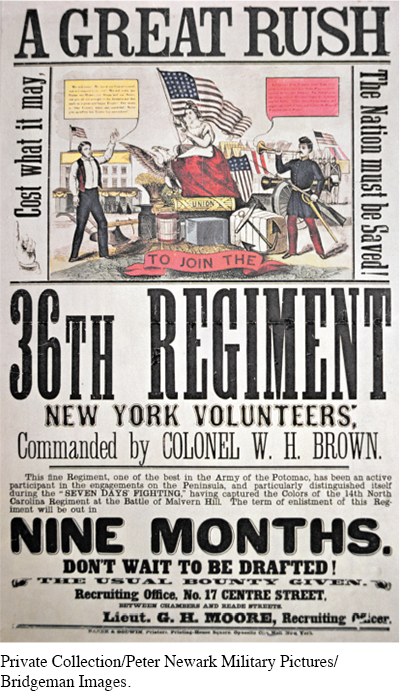Lincoln and Davis Mobilize
Mobilization required effective political leadership, and at first glance the South appeared to have the advantage. Jefferson Davis brought to the Confederate presidency a distinguished political career, including experience in the U.S. Senate. He was also a West Point graduate, a combat veteran and authentic hero of the Mexican-American War, and a former secretary of war. Dignified and ramrod straight, with “a jaw sawed in steel,” Davis appeared to be everything a nation could want in a wartime leader.
By contrast, Abraham Lincoln brought to the White House one lackluster term in the House of Representatives and almost no administrative experience. His sole brush with anything military was as a captain in the militia in the Black Hawk War, a brief struggle in Illinois in 1832 in which whites expelled the last Indians from the state. The lanky, disheveled Illinois lawyer-politician looked anything but military or presidential in his bearing.
Davis, however, proved to be less than he appeared. Although he worked hard, he had no gift for military strategy yet intervened often in military affairs. He was an even less able political leader. Quarrelsome and proud, he had an acid tongue that made enemies the Confederacy could ill afford. In his defense, the Confederacy’s intimidating problems might have defeated an even more talented leader.
With Lincoln the North got far more than met the eye. He proved himself a master politician and a superb leader. When forming his cabinet, Lincoln chose the ablest men, no matter that they were often his chief rivals and critics. He appointed Salmon P. Chase secretary of the treasury, knowing that Chase had presidential ambitions. As secretary of state, he chose his chief opponent for the Republican nomination in 1860, William H. Seward. Despite his civilian background, Lincoln displayed an innate understanding of military strategy. No one was more crucial in mapping the Union war plan.
Lincoln and Davis began gathering their armies. Confederates had to build almost everything from scratch, and Northerners had to channel their superior numbers and industrial resources to war. On the eve of the war, the federal army numbered only 16,000 men. One-third of the officers followed the example of the Virginian Robert E. Lee, resigning their commissions and heading south. The U.S. Navy was in better shape. Forty-two ships were in service, and a large merchant marine would in time provide more ships and sailors for the Union cause. Possessing a much weaker navy, the South pinned its hopes on its armies.
The Confederacy made prodigious efforts to build factories to supply its armies with tents, blankets, shoes, and uniforms, but even when factories produced what soldiers needed, southern railroads often could not deliver the goods. And each year, more railroads were captured, destroyed, or left in disrepair. Food production proved less of a problem, but food sometimes rotted before it reached the soldiers. The one bright spot was the Confederacy’s Ordnance Bureau, headed by Josiah Gorgas. In April 1864, Gorgas proudly observed: “Where three years ago we were not making a gun, a pistol nor a sabre, no shot nor shell . . . we now make all these in quantities to meet the demands of our large armies.”
> COMPARE AND CONTRAST
What were the greatest strengths and most significant weaknesses of each side at the start of the Civil War?
Recruiting and supplying huge armies required enormous new revenues. At first, the Union and the Confederacy sold war bonds, which essentially were loans from patriotic citizens. In addition, both sides turned to taxes. Eventually, both began printing paper money. Inflation soared, but the Confederacy suffered more because it financed a greater part of its wartime costs through the printing press. Prices in the Union rose by about 80 percent during the war, while inflation in the Confederacy topped 9,000 percent.[[LP Photo: P15.04 Federal Recruiting Poster/

Within months of the bombardment of Fort Sumter, both sides found men to fight and ways to supply them. But the underlying strength of the northern economy gave the Union the decided advantage. With their military and industrial muscles beginning to ripple, Northerners became itchy for action that would smash the rebellion. Horace Greeley’s New York Tribune began to chant: “Forward to Richmond! Forward to Richmond!”
> QUICK REVIEW
Why did the South believe it could win the war despite numerical disadvantages?
Understanding the American Promise 3ePrinted Page 411